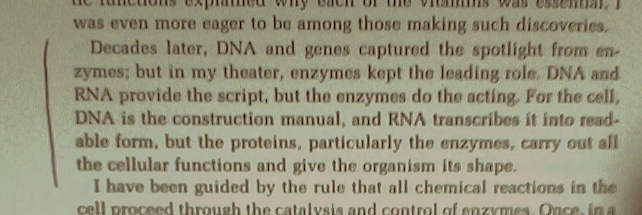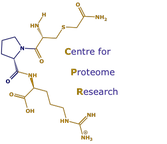Of scripts, actors, costumes and prostheses
Filed in: People
Today, in the IIB AwayDay, one of the early talks started with the comment that DNA provides the scripts, but proteins do the acting. It was attributed to James Watson (who has not covered himself in glory in recent years). In fact, I believe it has its origins in a remarkable book (on e that I read as a young biochemist when books were made of paper and we went to libraries). The book was “For the Love of Enzymes”. I particularly like the last sentence of the description.
here’s the relevant excerpt-

And
http://www.amazon.co.uk/For-Love-Enzymes-Odyssey-Biochemist/dp/0674307763
‘In 1645 the Japanese samurai Musashi Miamoto wrote A Book of Five Rings, which described the attitudes necessary for individual success. Though he was a swordsman, his book was not limited to combat but addressed the much broader question of how to achieve excellence in life through study, discipline, and planning. It is still avidly read in Japan today. Arthur Kornberg's book is a modern-day Book of Five Rings that replaces the medium of swordsmanship with that of biochemistry, particularly enzymology. As Kornberg describes his successive research problems, the challenges they presented, and the ultimate accomplishments that resulted, he provides us with a primer in the strategies needed to do scientific work of great significance. Moreover, these strategies are played out in the context of solving some of the great biochemical problems of the twentieth century.
The ability to manipulate and alter DNA fired a revolution that forever changed the nature of biology. Arthur Kornberg is a primary architect of that revolution, arguably one of the two or three most important biologists of this time. Prior to Kornberg, genetic information and later DNA were imbued by biologists with an almost vitalistic aura.
Kornberg demonstrated that DNA is a molecule synthesized by enzymes, like all other chemical constituents of the cell. More important, he trained a school of scientists who focused on and discovered many of the enzymatic activities that act on DNA. It is these enzymes in particular that allow modern "genetic engineering".
For the Love of Enzymes does not describe a single lucky or hard-won accomplishment. Rather, it is the story of thirty years of decisive campaigns, nearly all of which led to insights of major significance. In relating his story, Kornberg never avoids the difficult question of "why": why he felt classical nutritional studies had reached a plateau, why he turned to enzymology as a discipline’
here’s the relevant excerpt-

And
http://www.amazon.co.uk/For-Love-Enzymes-Odyssey-Biochemist/dp/0674307763
‘In 1645 the Japanese samurai Musashi Miamoto wrote A Book of Five Rings, which described the attitudes necessary for individual success. Though he was a swordsman, his book was not limited to combat but addressed the much broader question of how to achieve excellence in life through study, discipline, and planning. It is still avidly read in Japan today. Arthur Kornberg's book is a modern-day Book of Five Rings that replaces the medium of swordsmanship with that of biochemistry, particularly enzymology. As Kornberg describes his successive research problems, the challenges they presented, and the ultimate accomplishments that resulted, he provides us with a primer in the strategies needed to do scientific work of great significance. Moreover, these strategies are played out in the context of solving some of the great biochemical problems of the twentieth century.
The ability to manipulate and alter DNA fired a revolution that forever changed the nature of biology. Arthur Kornberg is a primary architect of that revolution, arguably one of the two or three most important biologists of this time. Prior to Kornberg, genetic information and later DNA were imbued by biologists with an almost vitalistic aura.
Kornberg demonstrated that DNA is a molecule synthesized by enzymes, like all other chemical constituents of the cell. More important, he trained a school of scientists who focused on and discovered many of the enzymatic activities that act on DNA. It is these enzymes in particular that allow modern "genetic engineering".
For the Love of Enzymes does not describe a single lucky or hard-won accomplishment. Rather, it is the story of thirty years of decisive campaigns, nearly all of which led to insights of major significance. In relating his story, Kornberg never avoids the difficult question of "why": why he felt classical nutritional studies had reached a plateau, why he turned to enzymology as a discipline’
